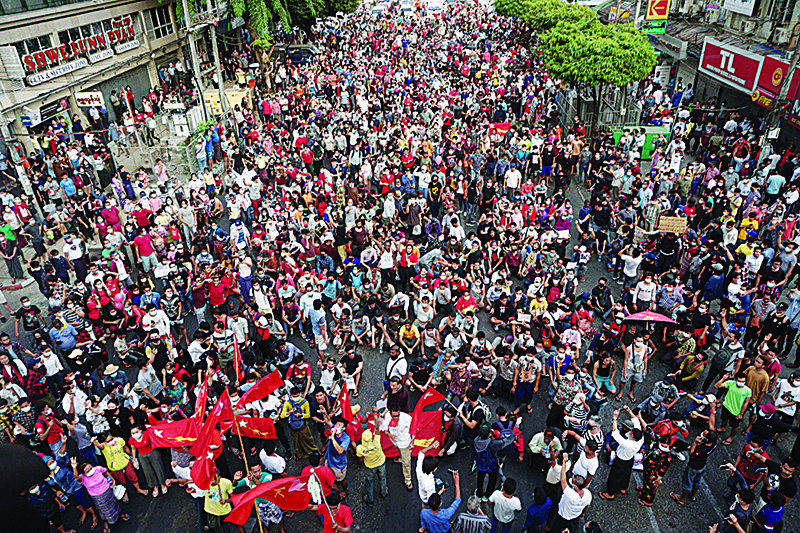 YANGON: Protesters take part in a demonstration against the military coup in Yangon yesterday. —AFP
YANGON: Protesters take part in a demonstration against the military coup in Yangon yesterday. —AFPYANGON: Myanmar saw its largest anti-coup protests yet yesterday with young demonstrators spilling on to the streets to denounce the country’s new military regime, despite a nationwide internet blackout aimed at stifling a growing chorus of popular dissent. Soon before nearly all lines of communication in and out of the country went dark. An Australian economic advisor to Myanmar’s deposed civilian leader Aung San Suu Kyi told the BBC yesterday he had been detained in the country following the coup. Macquarie University professor Sean Turnell is the first foreign national confirmed arrested by the new military junta since it took power on Monday after detaining Suu Kyi and other senior politicians from her National League for Democracy (NLD) party. “I’m just being detained at the moment, and perhaps charged with something. I don’t know what that would be,” he told the broadcaster. “Everyone’s being very polite... but obviously I’m not free to move or anything like that,” he added.
The internet shutdown did not stop several thousand demonstrators from gathering on a road near Yangon University, many holding up the three-finger salute that has come to symbolize resistance to the army takeover. “Down with the military dictatorship!” the crowd yelled, many donning red headbands-the color associated with Suu Kyi’s National League for Democracy party.
A large riot police contingent blocked nearby roads, with two water cannon trucks parked at the scene. Some protesters left the area without confrontation while others remain at the scene, with no reports of clashes with police so far. At least two other groups of demonstrators are marching through other parts of Myanmar’s biggest city, while as many as 2,000 people were marching further north in Mandalay, AFP reporters on the ground said.
All were out to condemn the dawn raids that brought a sudden halt to the country’s brief 10-year experiment with democracy on Monday, just as lawmakers elected in national polls last November were due to sit in parliament for the first time. “They don’t respect our people’s votes and I think they are betraying the country,” one protester told AFP. “Our revolution starts today.” Australian professor Sean Turnell became the latest figure associated with Suu Kyi-and the first confirmed foreign national-to be detained by the junta. “I’m just being detained at the moment, and perhaps charged with something. I don’t know what that would be,” Turnell, a longtime economics advisor to the Nobel laureate, told the BBC.
‘First contact’
Online calls to protest the army takeover had prompted increasingly bold displays of defiance against the new regime, including the nightly deafening clamor of people around the country banging pots and pans-a practice traditionally associated with driving out evil. Some have shown their opposition by gathering for group photographs with banners decrying the coup and flashing a three-finger salute earlier adopted by democracy protesters in neighboring Thailand. UN Secretary General Antonio Guterres said a special envoy to the country had made “first contact” with Myanmar’s deputy military commander to urge the junta to relinquish power to the civilian government it toppled. State media in Myanmar reported Saturday that junta figures had spoken with diplomats the previous day to respond to an international outcry and asked them to work with the new leaders.
As protests gathered steam this week, the junta ordered telecom networks to freeze users out of access to Facebook, an extremely popular service in the country and arguably its main mode of communication. “We strongly urge the authorities to order the unblocking of all social media services,” a Facebook representative said. “The people of Myanmar need access to important information and to be able to communicate with their loved ones.”
The platform had hosted a rapidly growing “Civil Disobedience Movement” forum calling on strikes at civil service offices and hospitals. The military widened its efforts to stifle dissent on Friday when it demanded new blocks on other social media services including Twitter.
Norway-based Telenor said yesterday it had complied with an order instructing telecoms to shut down the country’s entire mobile data network. “We have employees on the ground and our first priority is to ensure their safety,” a statement from the firm said.
Some internet-savvy users had managed to circumvent the social media block by using VPN services but by midday, online traffic had slowed to a standstill. “People in Myanmar have been forced into a situation of abject uncertainty,” said Ming Yu Hah of Amnesty.
“An expanded internet shutdown will put them at greater risk of more egregious human rights violations at the hands of the military,” she added. An immensely popular figure despite a tarnished reputation in the West, Suu Kyi has not been seen in public since the coup, but a party spokesman said Friday she was under house arrest and “in good health”.
US President Joe Biden was among world leaders this week to demand the generals “relinquish power... release advocates and activists and officials they have detained, lift the restrictions in telecommunications, and refrain from violence”. —AFP










